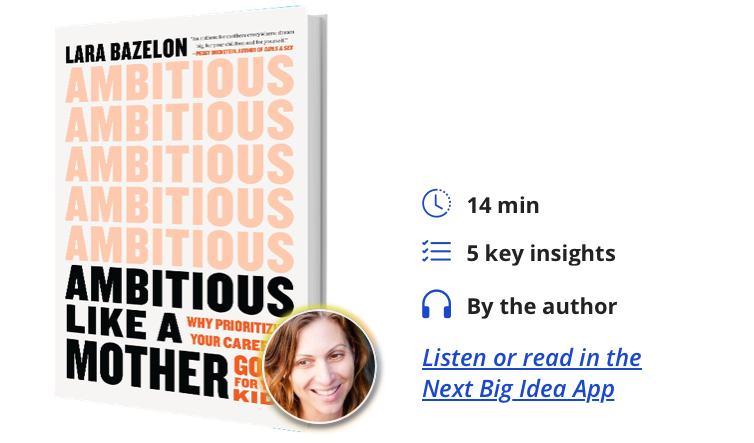Lara Bazelon is a law professor at University of San Francisco, where she holds the Barnett chair in Trial Advocacy. She is also a writer, and a mother.
Below, Lara shares 5 key insights from her new book, Ambitious Like a Mother: Why Prioritizing Your Career Is Good for Your Kids. Listen to the audio version—read by Lara herself—in the Next Big Idea App.

1. “Work-life balance” and the “selfless mother” are myths.
As a young mother, when I was offered a professional opportunity that separated me from my children, I usually took it. These opportunities fed my brain and my soul, but my choices also meant that I was less available to my children. For years, I agonized over my decisions, feeling guilt and shame, convinced I was a bad mother. I raced like a mouse in a maze, searching for work-life balance. I ran and ran, believing that if I rebounded from the dead ends and survived the booby traps, then I would arrive in this magical Eden. But there is no such place.
So stop chasing the same mirage and punishing yourself for failing to attain the impossible. It isn’t selfish to want to feed your brain and soul. It isn’t wrong to think that doing so requires something other than being a mother—quite the opposite. Choosing professional opportunities and prioritizing your career—not all of the time, but some of the time—models valuable lessons for your children, including independence, resilience, and the importance of using one’s talents and abilities to help others.
There is no work-life balance path to nirvana that selfless mothers walk. Instead, there is a bumpy road of everyday seepage, beauty, and mess. Today, American women are both empowered and imperiled like never before, so it is important to tell this truth. There is strength in women collectively pushing back and saying, “No more—we are going to shift the paradigm.”
2. Female ambition is not toxic.
I interviewed dozens of working mothers that were diverse across race, ethnicity, class, profession, sexual orientation, and geographic lines. They were married, single, widowed, and divorced. But they had one thing in common: a reflexive rejection of the idea that they are ambitious. Some suggested that I interview a truly ambitious mother—a sister, friend, or colleague. They considered themselves merely lucky or fortunate. I heard these words over and over again, along with “I was in the right place at the right time” offered up as a complete explanation for years of striving, determination, and demonstrated excellence. I imagined interviewing high-achieving men for a book about ambitious fathers. Their overwhelming response would likely be along the lines of, “So glad you found me!”
“Until women own their ambition, they will get neither the credit nor the opportunities they deserve.”
Women are afraid that if they own their ambition, then people will think they are ruthless, self-aggrandizing bitches. But ambition, according to the Oxford English Dictionary, simply means “having or showing a strong desire to succeed.” Eternal modesty and self-effacement are not winning strategies. Men are only too happy to co-opt and take credit for women’s ideas, seamlessly integrating them into their own achievements. Until women own their ambition, they will get neither the credit nor the opportunities they deserve.
Encouraging women to “go for it” at work, but only if they do so in a modest, feminine manner, creates obstacles to their success. The knife’s edge to walk—be attractive but not too attractive, hard-working but not in a “look at me” kind of way, assertive but not threatening—will end in a fall. Keeping to a prototype isn’t just impossible—it is unwise because it tells women to metabolize rather than push back against setbacks, ranging from gendered and belittling comments to harassment to getting passed over for plum assignments and promotions. Ambition is a good quality, so own it.
3. Embrace imbalance.
The debate around feminism has become stale and suffocating. It is time to reframe it as a feminism that dispenses with the false premise that women can live their lives in perfect equipoise if they try hard enough. In real life, the pendulum swings wildly: mothers who always make their children the primary focus are at one extreme, while mothers who never do so are at the other. Most of us live somewhere between the extremes: imbalanced but not unstable. It isn’t about “always” or “never”—it is about “sometimes,” “this time,” and “not all the time.”
“You can’t always give your children your time or full attention (no one can), yet there is little doubt that you always give them your love.”
In the words of the grown son of a working mother, think of “sliding weights from one end of the scale to the other: family to work, work to family, with rare times of perfect balance.” That imbalance is healthy and necessary—and it involves sharing sacrifices and burdens that should not be a mother’s alone to bear. He went on to explain:
“You can’t always give your children your time or full attention (no one can), yet there is little doubt that you always give them your love. While young people can get attached to things and events that society and our culture reinforce as important, nothing is more important than love, safety, and a sense of available support. I like to think of it as the way an AC electrical current is always available and ready, even when something is not plugged in. You yourself, with the aid of others, ensure that this crucial foundation is in place.”
4. Demand flexibility as we move forward from the pandemic.
Despite the viral “QuitTok” videos and extensive coverage of the Great Resignation (with all its meditations on anti-ambition or why work sucks) quitting is not financially feasible for most mothers. 40 percent of children depend primarily on maternal incomes. It may be on-brand and cathartic to yell “take this job and shove it!” on social media, but short-term performative outrage is not a recipe for long-term survival. After the standing ovation and riotous applause, the curtain will drop and you still need to stock the fridge. Your kids can’t eat a congratulatory bouquet. Besides, most women don’t want out—they just want support from their employers at work and their partners at home.
The key is a permanent pivot toward work flexibility. This has the potential to transform the lives of millions of mothers, including women with front-facing positions concentrated in pink- and blue-collar industries. A career services manager for a national job site organization told me that “working mothers are in a stronger position than they realize. People who are staying put are highly valuable because it is difficult to hire right now—there is such a fight for talent, including in hospitality, nursing, and teaching. We have counseled our clients to bargain for extra vacation, flexible work hours, and offsetting the costs of their childcare and commuting.”
“Short-term performative outrage is not a recipe for long-term survival. After the standing ovation and riotous applause, the curtain will drop and you still need to stock the fridge.”
The pandemic has fundamentally altered the way we conceive of our day-to-day lives and existential purpose. It has led to mass death and suffering—social, educational, and economic. But it also helped dismantle workplace structures that were overdue for an overhaul. Because of scarcity in the labor market and working mothers’ proven track record of producing excellent work under flexible conditions, we have a unique opportunity to bargain for an end to the conditions that have made so many working mothers miserable.
5. The kids will be alright.
Empirical studies show that children of working mothers do fine—in fact, many thrive. The daughters of working mothers were more likely to be employed, earn higher wages, and have jobs with supervisory responsibilities. Meanwhile, their sons were more likely to devote time to caregiving and domestic responsibilities than the children of stay-at-home mothers. The study, led by Harvard Business School professor Kathleen McGinn, assessed 100,000 adult children across 24 developed countries and found that the children of working mothers were just as happy as the children of stay-at-home mothers.
My mother was a full-time physician. I am one of four children, but my mother made time for me. Not in the same way that stay-at-home mothers (or mothers with fewer children) did for their kids, but when I needed her, she was there. She is the person I call when I am frightened, desperate, or don’t know what to do. Among the children of ambitious mothers, reliance on one’s mother—on her sound judgment, resourcefulness, and support—during life’s worst moments is a recurring theme.
When your kids are adults, what will they remember about your mothering? Perfectly curated photographs of family joy? Probably not. Blurry images of absence and distraction from the times you weren’t there? Maybe, but not mostly. They will remember a rich, textured patchwork.
For my kids, that means yelling, fighting, and the miserable parts, yes, but more importantly, the many times we laughed so hard that tears rolled down our faces—at episodes of The Office, inside jokes, or just at each other—the visit to the zoo when a seagull swooped down and ate our pizza, the time that their father and I carried them on our backs across an icy stream on vacation after we had divorced, the day we brought our puppy home, and the many nights we snuggled together in bed. They will also remember my work and how much it meant to my clients, students, readers, and to me. I hope that those memories will make them proud, and also inspired to be equally ambitious in their own right.
To listen to the audio version read by author Lara Bazelon, download the Next Big Idea App today:































